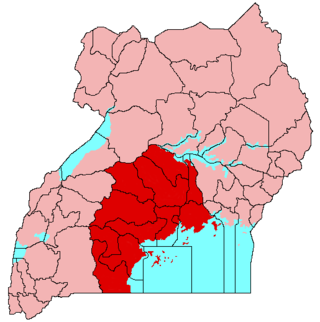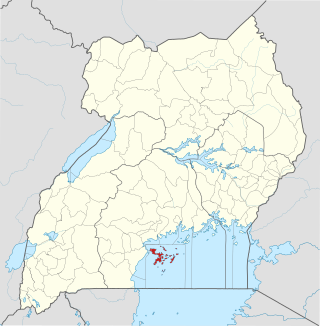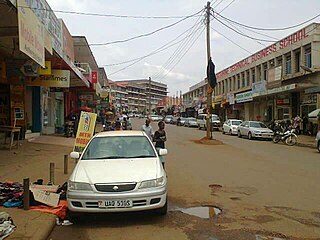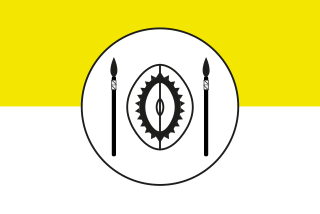
Buganda is a Bantu kingdom within Uganda. The kingdom of the Baganda people, Buganda is the largest of the traditional kingdoms in present-day East Africa, consisting of Uganda's Central Region, including the Ugandan capital Kampala. The 14 million Baganda make up the largest Ugandan region, representing approximately 16% of Uganda's population.

The Ssese Islands are an archipelago of eighty-four islands in the northwestern part of Lake Nalubaale in Uganda. The islands are coterminous with the Kalangala District in southern Central Uganda, which does not have any territory on mainland Uganda.

Kalangala, also known as Ssesse, is a district in Central Uganda. The district is coterminous with the Ssese Islands in Lake Victoria and does not have territory on mainland Uganda. Like other Ugandan districts, it is named after its 'chief town', Kalangala which is located on Bugala Island, the largest of the Ssese Islands.

Mpigi District is a district in Central Uganda. Like most other Ugandan districts, it is named after its 'main town', Mpigi.

Mukono is one of the districts in the Central Region of Uganda. The town of Mukono serves as the district headquarters and is home to the district's main commercial center.

Rakai District is a district in the Central Region of Uganda. The town of Rakai is the site of the district's headquarters.

Sembabule District is a district in the Central Region of Uganda. The town of Sembabule is the site of the district headquarters. Other urban centers in the district include Lwemiyaga and Ntuusi.

Wakiso District is a district in the Central Region of Uganda that partly encircles Kampala, Uganda's capital city. The town of Wakiso is the site of the district headquarters. Kira, the country's second largest city and suburb of Kampala, is in the district.

Masaka is a district and a city in the Buganda Region in southern Uganda, west of Lake Victoria. The city is the headquarters of Masaka District.
Rakai is a town in the Central Region of Uganda. It is the site of the headquarters of Rakai District. Other towns in the district include Kalisizo, Kyotera Kakuuto and Mutukula.
Mpigi is a town in Mawokota County, Mpigi District, in Central Uganda. Mpigi is the municipal, administrative and commercial headquarters of Mpigi District. The district is named after the town.

The Chiefdom of Kooki, also known as the Kooki chiefdom, was a pre-colonial African kingdom located within present-day Rakai District of Uganda that existed from approximately 1740 until 1896. The kingdom ceased to exist as an independent state in 1896 when it merged into the British Protectorate of Buganda. Its royal line still continues to this day as a Chiefdom, and is currently led by The Kamuswaga Apollo Sansa Kabumbuli II a hereditary Saza Chief on behalf of the Kabaka of Buganda. In 27 July 2015, the Kooki Kingdom declared independence from Buganda but it wasn't recognized by Buganda or Uganda.

Lyantonde District is a district in southern Central Uganda. It is named after the 'chief town' of the district, Lyantonde, where the district headquarters are located.
Kalisizo is a town in the southern part of the Central Region of Uganda. Although it is the leading commercial center in Kyotera District, the administrative headquarters of the district are in Kasaali.
Lukaya is a town in the Kalungu District of the Central Region of Uganda.
Masaka Regional Referral Hospital, commonly known as Masaka Hospital is a hospital in the city of Masaka, in south-central Uganda. It is the referral hospital for the districts of Kalangala District, Lyantonde, Masaka and Sembabule, Kalungu, Lwengo, Bukomansimbi and Rakai.

Bukomansimbi District is a district in Central Uganda. The district is named after its main municipal center, Bukomansimbi, the location of the district headquarters.

Butambala District is a district in the Central Region of Uganda.
Buddu is a county (Ssaza) of the kingdom of Buganda in what is now Uganda.












